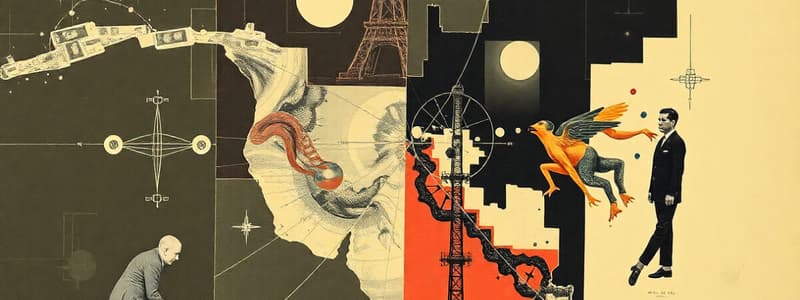Podcast
Questions and Answers
What principle does Newton's First Law of Motion illustrate?
What principle does Newton's First Law of Motion illustrate?
- Actions have equal and opposite reactions.
- An object accelerates if a force is applied.
- Objects at the same temperature are in thermal equilibrium.
- An object stays in motion unless acted upon by a net external force. (correct)
Which equation represents Newton's Second Law of Motion?
Which equation represents Newton's Second Law of Motion?
- F = ma (correct)
- F = m/a
- F = m + a
- F = mv
What type of energy is associated with an object's motion?
What type of energy is associated with an object's motion?
- Potential Energy
- Thermal Energy
- Chemical Energy
- Kinetic Energy (correct)
Which law states that energy cannot be created or destroyed?
Which law states that energy cannot be created or destroyed?
Which of the following is a property of waves?
Which of the following is a property of waves?
What is the second law of thermodynamics primarily concerned with?
What is the second law of thermodynamics primarily concerned with?
What describes how electric and magnetic fields interact?
What describes how electric and magnetic fields interact?
In quantum mechanics, what phenomenon describes particles exhibiting both wave-like and particle-like properties?
In quantum mechanics, what phenomenon describes particles exhibiting both wave-like and particle-like properties?
Flashcards are hidden until you start studying
Study Notes
Key Concepts in Physics
Fundamental Categories
- Classical Mechanics: Study of motion, forces, and energy.
- Electromagnetism: Deals with electric and magnetic fields and their interactions.
- Thermodynamics: Focuses on heat, work, and energy transfer.
- Modern Physics: Includes quantum mechanics and relativity.
Laws of Motion
- Newton's First Law: An object at rest stays at rest, and an object in motion stays in motion unless acted upon by a net external force.
- Newton's Second Law: Force equals mass times acceleration (F = ma).
- Newton's Third Law: For every action, there is an equal and opposite reaction.
Energy Forms
- Kinetic Energy (KE): Energy of an object due to its motion (KE = 1/2 mv²).
- Potential Energy (PE): Energy stored due to position (e.g., gravitational PE = mgh).
- Mechanical Energy: Sum of kinetic and potential energy in a system.
Conservation Laws
- Conservation of Energy: Energy cannot be created or destroyed, only transformed.
- Conservation of Momentum: In a closed system, the total momentum before and after an event remains constant.
Thermodynamics Laws
- Zeroth Law: If two systems are in thermal equilibrium with a third system, they are in equilibrium with each other.
- First Law: Energy cannot be created or destroyed; the change in internal energy equals heat added minus work done.
- Second Law: Entropy of an isolated system always increases; heat cannot spontaneously flow from cold to hot.
- Third Law: As temperature approaches absolute zero, the entropy of a perfect crystal approaches zero.
Waves and Oscillations
- Wave Properties: Wavelength, frequency, amplitude, speed.
- Types of Waves:
- Mechanical Waves: Require a medium (e.g., sound).
- Electromagnetic Waves: Do not require a medium (e.g., light).
- Oscillations: Repeated back-and-forth motion (e.g., pendulums).
Electromagnetism
- Electric Field: Area around a charged object where it can exert force on other charges.
- Magnetic Field: Region around a magnet where magnetic forces can be observed.
- Maxwell's Equations: Set of four equations that describe how electric and magnetic fields interact.
Modern Physics
- Special Relativity: Time and space are relative; speed of light is constant in a vacuum.
- Quantum Mechanics: Describes physical phenomena at microscopic scales; introduces concepts like wave-particle duality.
Important Units
- Force: Newton (N)
- Energy: Joule (J)
- Power: Watt (W)
- Charge: Coulomb (C)
- Temperature: Kelvin (K)
Applications of Physics
- Engineering: Design and analysis of structures and systems.
- Medical Physics: Applications in imaging and treatment (e.g., MRI, radiation therapy).
- Astrophysics: Study of celestial bodies and the universe.
Notable Physicists
- Isaac Newton: Laws of motion and universal gravitation.
- Albert Einstein: Theory of relativity and photoelectric effect.
- Niels Bohr: Quantum theory of atomic structure.
Key Concepts in Physics
Fundamental Categories
- Classical Mechanics examines motion, forces, and energy interactions.
- Electromagnetism covers electric and magnetic fields along with their behaviors.
- Thermodynamics studies heat transfer, work, and energy conservation.
- Modern Physics encompasses quantum mechanics and the theory of relativity.
Laws of Motion
- Newton's First Law states that an object remains at rest or in uniform motion unless influenced by an external force.
- Newton's Second Law establishes the relationship between force, mass, and acceleration (F = ma).
- Newton's Third Law asserts that every action has an equal and opposite reaction.
Energy Forms
- Kinetic Energy (KE) is the energy attributed to motion, calculated as KE = 1/2 mv².
- Potential Energy (PE) is energy stored due to an object's position, with gravitational potential energy expressed as PE = mgh.
- Mechanical Energy is the total energy in a system, combining kinetic and potential energy.
Conservation Laws
- The Conservation of Energy principle states that energy cannot be created or destroyed, only transformed between forms.
- The Conservation of Momentum indicates that the total momentum in a closed system remains unchanged before and after an event.
Thermodynamics Laws
- The Zeroth Law of Thermodynamics states that if two systems are each in thermal equilibrium with a third system, they are in equilibrium with each other.
- The First Law of Thermodynamics asserts that energy change in a system equals heat added minus work done.
- The Second Law states that entropy in an isolated system always increases; heat flows spontaneously from hot to cold.
- The Third Law indicates that as temperature approaches absolute zero, the entropy of a perfect crystal approaches zero.
Waves and Oscillations
- Key properties of waves include wavelength, frequency, amplitude, and speed.
- Mechanical Waves require a medium (e.g., sound waves), while Electromagnetic Waves do not (e.g., light waves).
- Oscillations refer to periodic movements, such as those seen in pendulums.
Electromagnetism
- An Electric Field is the region around a charged body that exerts forces on other charges.
- A Magnetic Field surrounds a magnet and reveals magnetic forces at play.
- Maxwell's Equations consist of four equations that define the interconnections between electric and magnetic fields.
Modern Physics
- Special Relativity introduces the concept that time and space are relative, with the speed of light being constant in a vacuum.
- Quantum Mechanics addresses physical phenomena at microscopic levels, introducing ideas like wave-particle duality.
Important Units
- Force is measured in Newtons (N).
- Energy is quantified in Joules (J).
- Power is expressed in Watts (W).
- Charge is measured in Coulombs (C).
- Temperature is recorded in Kelvin (K).
Applications of Physics
- Engineering focuses on the design and analysis of structures and mechanical systems.
- In Medical Physics, principles of physics are applied in imaging techniques and treatments such as MRI and radiation therapy.
- Astrophysics involves the exploration of celestial bodies and the vast universe.
Notable Physicists
- Isaac Newton is known for formulating the laws of motion and universal gravitation.
- Albert Einstein developed the theory of relativity and made significant contributions to understanding the photoelectric effect.
- Niels Bohr advanced the quantum theory, particularly regarding atomic structure.
Studying That Suits You
Use AI to generate personalized quizzes and flashcards to suit your learning preferences.




